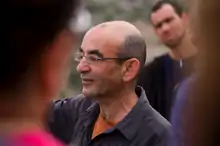Raja Shehadeh
Raja Shehadeh (born 1951) is a Palestinian lawyer and writer, who was born in Jaffa,[1] Israel and who currently lives in Ramallah, West Bank.

Biography
Raja Shehadeh studied law in London. His grandfather, Saleem, was a judge in the courts of the British Mandate of Palestine. His great-great-uncle, the journalist Najib Nassar, founded the Haifa-based newspaper Al-Karmil in the last years of the Ottoman Empire, before World War I. His father, Aziz, also a lawyer, was one of the first Palestinians to publicly support a two-state solution to the Arab-Israeli conflict.[2] Shehadeh is from a Palestinian Christian family.[3] Adam Shatz has cited Shehadeh as one of two people who have provided a formative influence of his understanding of the Middle East conflict, writing that 'Anguished and somewhat fragile, he is a man who, in spite of his understandable bitterness, has continued to dream of a future beyond the occupation, a kind of neo-Ottoman federation where Arabs and Jews would live as equals.'[4]
Legal and literary career
Shehadeh is a founder of the human rights organization Al-Haq,[2] an affiliate of the International Commission of Jurists. He has written several books on international law, human rights and the Middle East.[5] Strangers in the House was described by The Economist as "distinctive and truly impressive".[6] In 2008, he won the Orwell Prize, Britain's pre-eminent award for political writing, for his book Palestinian Walks.[7] Shehadeh was critical of the Palestinian National Authority for having imported on its return the prejudices of the Palestinian diaspora. He himself resigned his work as an advisor in dissent from the PLO during the Madrid peace negotiations, and considers the continuing hostility of the Palestinian diaspora for failing to come to terms with the realities of Palestinians who have endured the occupation for decades, and who have built their civic institutions while exercising the traditional values of sumud rather than indulging in impractical cults of heroism.[8][9] In July 2018, his biographical Where the Line is Drawn: Crossing Boundaries in Occupied Palestine was chosen for BBC Radio 4's Book of the Week, and was narrated by actor Peter Polycarpou.
Bibliography
- Strangers in the house. Steerforth Press. 2002.
- When the Bulbul Stopped Singing (2003)
- Palestinian Walks: Forays into a Vanishing Landscape (2007, 2nd edition published as Palestinian Walks: Notes on a Vanishing Landscape (2008)
- A Rift In Time: Travels With My Ottoman Uncle (2010)
- Occupation Diaries (2012)
- Where the Line is Drawn: Crossing Boundaries in Occupied Palestine (2017)
- Language of War, Language of Peace (2015)
- Life Behind Israeli Checkpoints (2017)
Book reviews
| Year | Review article | Work(s) reviewed |
|---|---|---|
| 2019 | Shehadeh, Raja (March 7–20, 2019). "Bearing witness in the West Bank". The New York Review of Books. 66 (4): 33–34. | Shulman, David. Freedom and despair : notes from the south Hebron hills. Chicago: University of Chicago Press. |
Critical studies and reviews of Shehadeh's work
- Strangers in the house
- "Strangers in the house : coming of age in occupied Palestine". ReadingGroupGuides. The Book Report, Inc.
References
- outis115 (17 March 2015). "BBC HARDtalk - Raja Shehadeh, Palestinian Human Rights Activist and Writer (16/3/15)" – via YouTube.
- Aguirre, Abby (12 August 2008). "Roaming freely in a land of restraints". New York Times. Retrieved 1 April 2009.
- Buchan, James (3 May 2003). "Shattered lives". The Guardian. London. Retrieved 22 February 2011.
- Adam Shatz, 'Writers or Missionaries? A reporter’s journey involves writing with a sense of history and without false consolation,' The Nation July 15, 2014.
- "Grey is hard to find". The Economist. 362 (8256): 72. 19 January 2002.
- Stephen Brook (25 April 2008). "Hari and James take Orwell prizes". The Guardian. London. Retrieved 25 April 2008.
- Nicholas Blincoe, 'Phantom Bids,' London Review of Books 14 August 2014
- Raja Shehadeh, 'Advice to the Palestinian Leadership,' London Review of Books Vol. 36 No 13, 3 July 2014 pages 10-13
External links
- Works by or about Raja Shehadeh in libraries (WorldCat catalog)